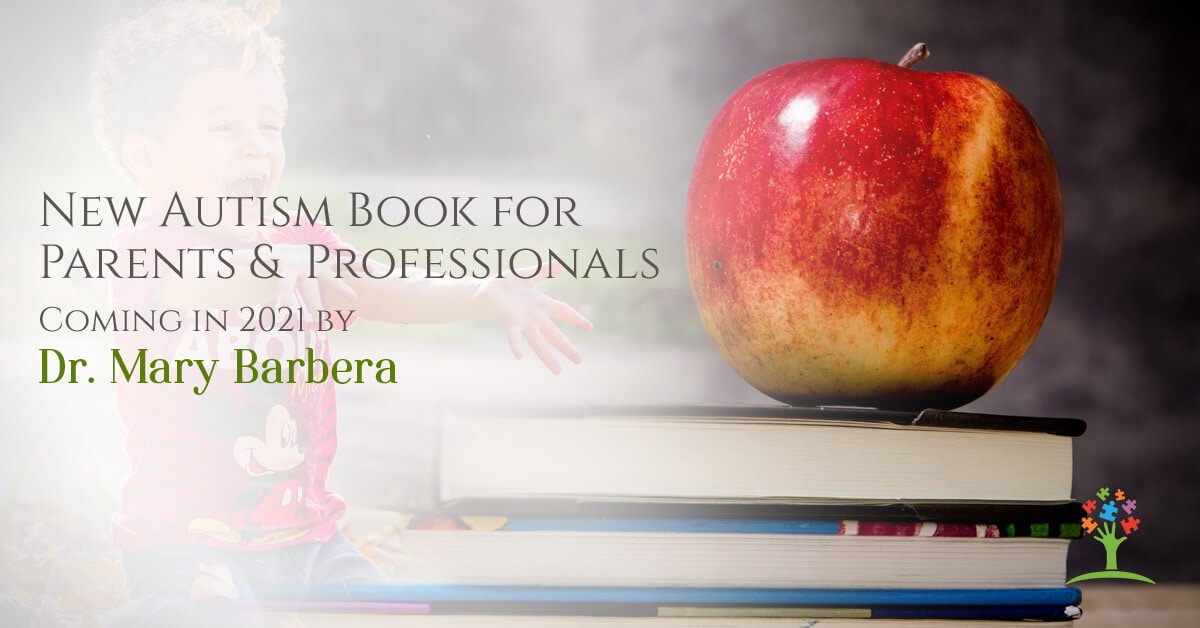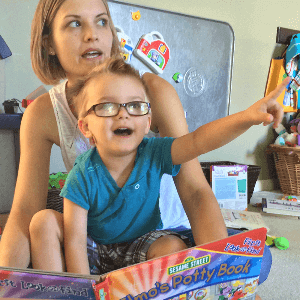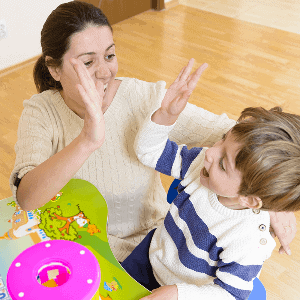#058: New Autism Book for Parents & Professionals Coming in 2021 by Dr. Mary Barbera

If you’ve been listening to my podcast for very long or you’re a part of my Facebook groups, then you already know all about my first book, The Verbal Behavior Approach. I wrote that book back in 2007 and it’s sold in multiple different languages, and it’s selling better than ever before. I wasn’t planning on writing a second book but I feel like I have too much important information to not share in as many ways as possible.
So what is the premise of my new book? What is the release date? Who is the target demographic? That’s what I’m going to be sharing with you today!
Did today’s episode give you something to think about? Do you have a question for me, or a topic you would like to see covered in the future? Email me at [email protected]!
Mentioned in this episode:
— Mary Barbera Workshop (Sign up for a free online workshop for parents and professionals)
— The Verbal Behavior Approach Book, by Dr. Mary Barbera
— Top 10 Autism Resources and Episodes from The Turn Autism Around Podcast
— 053: Dr. Mark Sundberg- Using VB-MAPP to Assess and Teach Language
— Speech Delay vs. Autism: Recognize the Signs to Delayed Speech in Children
Subscribe & Review in Apple Podcasts
Are you subscribed to my podcast? If you’re not, take action and subscribe today! Whether you’re a parent or a professional, you don’t want you to miss an episode. Click here to subscribe in Apple Podcasts!
If you like what you hear, I would be really grateful if you left me a review over on Apple Podcasts, too. Five-star ratings and great reviews help me to help others start turning autism around. Just click here to review, select “Ratings and Reviews” and “Write a Review” and let me know what your favorite part of the podcast is. Still unsure? Here’s a video to walk you through it. Thank you!
You’re listening to the Turn Autism Around podcast. I’m your host, Dr. Mary Barbera, and I am thrilled to do this episode. It actually was a Facebook live recording back in mid-January, and I am announcing the fact that I’m writing a new book, and I talk about why I am writing a new book.
You probably, if you’re here and you’ve been listening for a while, probably know that I am the author of the bestselling book, The Verbal Behavior Approach: How to Teach Children With Autism and Related Disorders. That book is available in multiple languages. And I am pretty sure, almost a hundred percent confident that my new book is going to make it that book, The Verbal Behavior Approach, look small. So I’m super excited.
So this is a Facebook live turned into a podcast. We’re trying these things out as we go to try and get the message out in multiple ways. If you are not a part of my Facebook page you can go and like that page and follow it at marybarbera.com/Facebook, so that when I do go live, which I’m hoping to do a lot more regularly in 2020, you will be notified and you can see all the great things I post throughout the week. So I encourage you to join me on Facebook lives and I hope you enjoyed this episode where I talk all about my new book, why I’m writing it, what it’s going to be about. So let me know any thoughts, you know, email me, leave me a comment and share this podcast episode with others who might want to know the big announcement, too.
Welcome to the Turn Autism Around podcast for both parents and professionals in the autism world who want to turn things around, be less stressed, and lead happier lives. And now your host, autism mom, behavior analyst, and bestselling author, Dr. Mary Barbera.
Hey there. It’s Dr. Mary Barbera here, and I am ready to give you a special announcement that I think most of you have missed. In case you have no idea who I am or what I’m about: I am Mary Barbera. I “fell”, I say quote unquote, into the autism world over two decades ago when my firstborn son, Lucas, was diagnosed with autism one day before his third birthday. At the time I was a master’s prepared registered nurse. And then I was really confused as to what I was supposed to do. And so I really struggled. I felt like I fell into like this big dark hole and I had to figure out how to climb out. I was extra guilty too, because… I felt guilty because I had been in denial since Lucas was 21 months of age when my husband, who’s a physician, first mentioned the possibility of autism when Lucas was 21 months.
So I at that point was horrified. I had no idea what autism looked like in a toddler. And I told my husband on that day, I never ever want to hear the word autism again. And so I went into a very deep state of denial. So you know, I’ve done some video blogs about denial because denial is still really real and a really a problem. So at the time back in 1999 when Lucas was diagnosed, the rate of autism was one in 500, and now it is about one in 50. I know the real, you know, the rate that’s quoted the most is one in 58, but I have also read studies where it’s one in 40, one in 29. So I’m going to say it was roughly one in 500 when Lucas was diagnosed, and it’s roughly one in 50 kids now being diagnosed with autism, which is really a challenge.
So not only now do we have denial to deal with, usually one parent or the other or the grandparents or somebody is in denial. In my case, it was me. It was over a year and a half I was in denial, which was really, really problematic. But not only do we have denial, now we have one in 50 kids, maybe one in a hundred kids trying to get evaluated to see if it’s autism or not. I mean, one in 25 kids, it was like more kids then one in 50 are going to you know, need to rule out or rule in autism. And so the waiting lists for those evaluations and treatment are really long; nine months to two years in many parts of the United States.
So let me get to the big announcement, which is related to some degree to the podcast with Dr. Mark Sundberg. As some of you may have known, I started my podcast, the Turn Autism Around podcast, in January of 2019 so we’re not even quite a year. After I started publishing podcasts every single Tuesday and I’ve done multiple interviews, and I have been trying to get Dr. Mark Sundberg, who is my main mentor in terms of ABA and verbal behavior… He, Dr. Sundberg wrote the forward for my book, The Verbal Behavior Approach, How to Teach Children With Autism and Related Disorders. And so while we were doing the interview with Mark, I asked Mark at one point, how do we move things forward? Like, it just feels like such a mess. You know, people getting ABA, the kids are crying or their kids are not making progress. Like how do we move the field forward? And Dr. Sundberg said, basically through education, and he talked about my book, which is my new book, not The Verbal Behavior Approach.
The Verbal Behavior Approach book was published in 2007, it’s sold tens of thousands of copies. Five years ago the number was 50,000 copies. I am sure that it’s more than double that I just can’t get the actual numbers, which is kind of confusing, but it’s translated into over a dozen languages. It’s done really well. Dr. Sundberg wrote the forward, and it’s still selling better than ever. So my big announcement is that I am writing a second book.
And I didn’t think I was writing a second book. Last year t this time, writing a second book was not even on my radar. And so you might be saying, okay, so what’s the new book and why now, and what’s going to be the difference between The Verbal Behavior Approach book and this new book.
So the new book, it does have a tentative title but I’m not going to really talk about the title yet, but the book, the whole premise of the book is basically to help mostly parents and early intervention professionals; as well as grandparents and other worried people who are worried about children who might have autism. Because of the autism rate being about one in 50 now, the waiting lists are huge to get evaluated, to get treatment. And so what is happening for these little kids, ages one to four or five years of age, is that they, like me, the parents might be in denial, one or both of the parents, they might be treating the child just for a speech delay… which I did a video blog called Is It Autism or Speech Delay? And that video blog that I did about a year ago has over 400,000 views.
It’s a very popular topic because there’s a lot of worry and a lot of anxiety when you have a toddler or even a preschooler who is delayed with language; delayed with socialization; having problem behaviors; having sensory differences. There’s also a lot of well-meaning professionals who are coming in and saying, okay, we have a problem. He has a pacifier in his mouth. So an occupational therapist for instance might say, well he needs the pacifier to soothe themself and dah, dah, dah. And then the speech pathologist who will come in for another hour a week might say, Oh no, we have to get rid of the pacifier to make language come better.
And so these parents who might be thinking it’s just a speech delay or might be really worried about autism, maybe even on a wait list that’s lasting for nine months or two years, are given contradictory advice. They might be listening to their neighbor, they might be trying to parent they way they did with their older child or older children. And so the child, instead of getting better and making progress every day, is actually regressing. Whether that’s autism, whether that’s ADHD, whether that’s eventually a learning disability or some kind of other issue, it is really a problem.
And the other big problem with waiting and worrying is there is a best window of opportunity. In addition to being a behavior analyst, I’m also a registered nurse and so when I worked as a registered nurse with head injury patients and spinal cord injury patients, stroke patients, it was clear, even heart attack patients, which I did, I was on the neuro unit… But any kind of condition, it’s always best to treat as soon as possible. So in strokes for instance, we talk about the golden hour after having a stroke in terms of like a head injury, we talk about like the golden year or a stroke where the first year is where you’re going to see the most progress.
And when I was in denial from the time Lucas was 21 months until he was just before he was three, when he was actually diagnosed, that was a whole long window of 18 months almost where I was waiting and worrying. My husband had mentioned the possibility of autism. I shut that down. I was just trying to just barrel through because I didn’t know that there was effective treatment. It’s not just an hour a week of speech or an hour a week of OT or even six hours a week of a eclectic type of therapy. The best, most proven treatment for autism is intensive ABA therapy.
The problem is that a lot of times you need a diagnosis for that. And what I’ve found over the last two decades as a behavior analyst is, you know, these techniques work for typically developing children; children with speech delays; children who are just stubborn, have personalities that are just high maintenance. These techniques work for kids with early signs of ADHD, or early signs of learning disabilities. I mean, it’s basically great parenting and its great quick assessments, quick treatment, easy programs that you can do for like 15 minutes a day.
And what I found over the years as I created my online courses and communities is that this works without a lot of… I worked one on one with little kids. So that’s where I developed my systems. So when I put it online, starting in 2015 so five years online now selling online courses, I actually wasn’t positive that it was going to work very well without any input from me.
But what’s happening is I’m seeing the power of all of these parents and grandmothers and early intervention professionals who are saying like… Eight months of no progress, zero words; I’m using your strategies, you’re teaching us and you’re showing videos about, and now my son or grandson is talking. I mean, multiple people, they’re talking, their tantrums are way down. They’re eating better, they’re sleeping in their own bed through the night. They got rid of the pacifier, we got rid of the bottle just with an online course without any direct coaching or direct observation by me or anybody like me.
And so I didn’t think I was going to write another book because as I said, The Verbal Behavior Approach book is selling better than ever. And it’s 2007 it was published, it was written in 2006 many, many years ago. Right? But all the content, I wrote the book thinking I’m going to write this as evergreen as possible. And my new book will be written also as evergreen as possible, meaning in 10 years it’s not going to have a big focus on the rate of autism or the rate of speech delay or anything that’s going to go out of date as soon as the book’s published.
It’s going to be very practical strategies, combining everything I’ve learned over the past two decades to really help parents where they’re at. Whether they have a one year old that they’re just worried about; whether they have a three year old with a diagnosis; whether they have a four year old who’s getting kicked out of preschool, this is where we can make the most progress, the safest way.
So if somebody comes to me with a two year old and joins my online course, my toddler course, with a two year old who’s tantruming at the grocery store, you know, it’s very normal to pick up a two year old who’s tantruming and put them in the car or pick up a two year old and put them in the car seat. When that two year old gets bigger and is eight or 10 or 12, it’s not safe anymore to where you can’t physically can’t pick kids up. And so I want to get to parents who are just worried in that critical window of the first year or two after the first symptoms arrive to really get them empowered to go. Like I can become the captain of the ship. I can make the difference here. I can coordinate things.
I’m not saying that you could do it all alone for the rest of the child’s life. I’m just saying it’s a quick start. Even if children are in ABA programs, if they’re in programs that are not ABA, if the child isn’t making progress across home, school, community in every area, then there is knowledge that I probably have that I can give you to help get them to the next level.
So I was not interested in writing another book. I was going to focus just on my online courses, but I went to a Mastermind, which is like a business workshop with about 12 or 14 people last June of 2019 with my biggest online mentor, Jeff Walker, who wrote the New York times number one bestselling New York times book called Launch. I had purchased the book launch back in 2014, devoured the book, and that little $15 book helped me to start my first online course. So I highly recommend that book launch by Jeff Walker.
Jeff, when I was at his secret headquarters in Durango, Colorado in June with some other online business owners, we were on a break and one of my colleagues came over to Jeff with his launch book in another language. And she said, Jeff, what language is this? Do you know? And he’s like, I have no idea. And at that point I said to Jeff, well, how many languages is your book in? And he said, Oh, like 12 or 13. And I go, that’s so funny because my books in 12 or 13 languages. And Jeff is in the process of doing a revision, doing a second edition of the book launch through a publisher named Hay House. And so we got talking about his updated book and his revision. And I looked at him and I said, Jeff, do you think I should write another book?
And he knows my mission is huge. He knows I’ve been a very good student of his since 2016 and he said, I absolutely think you need to write another book. And he has been very supportive, helped me make some connections to Hay House. And I ended up getting an agent through connections with Jeff Walker’s world and I ended up with a bidding war over my new book. So I really envision like my first book, The Verbal Behavior Approach, is published by Jessica Kingsley publishers in the UK, that’s now owned by Hatchet in UK. But I didn’t have an agent. I didn’t have a platform. I didn’t even have a website back in 2006 when I wrote my first book.
Now I do, I have all those things. I have a website, I have a platform, I have a podcast, I have online courses and I have a big mission and I’m super excited. I think this new book, which is going to come out in April of 2021 so it takes a while to publish a big book with a big publisher. It takes a while. This is actually sooner than the other options I had. So I’m going to spend the whole year writing my book. And at the same time, I’m still supporting parents of older kids and professionals who work with a wide range. But I really do think that focusing on the little guys focusing on how to help parents who… It may just be a speech delay may, there may not be anything wrong.
But we need to teach parents how to, what you do when a child tantrums; what you do when they only eat five or 10 foods and refuse to use utensils; what to do when they won’t sleep in their own bed; what to do when they refuse to get a bath; how to get them talking, how to get them echoing you; and how to get them to play in preschool and how to get the preschool teacher to, you know, work with you and your child to give them the best opportunities. And there’s just so much that’s going to be in this new book that I’m super excited about.
So I just signed the contract. Yes, two days ago. But the announcement was made really it was kind of buried in there. And it was kind of cut and pasted at the very end. And it’s my longest podcast by far. Usually my podcast episodes are only 30 to 45 minutes, but Dr. Sundberg went an hour and 10 minutes. And so anyway, the announcement got very buried at the very, very end. So I wanted to do another episode where I’m just talking about my new book, same mission, same mission to help turn autism around. And for a little child without a diagnosis of autism, you know, the sky’s the limit what that could look like.
And for an older child, there’s always room to turn autism around to some extent. There’s always room for hope and there’s always room to learn the most to help kids and clients do better and to be as safe, as independent, and as happy as possible, which has been my mission.
So that’s my news. That’s my special announcement actually. I have flowers here and balloons here to celebrate the big announcement. And I am thrilled to have gotten a contract with a major publisher who I’m going to get PR… it is going to be big.
It’s not going to be for another year, April of 2021, but I am going to be working very hard in the next six months to actually write the book and make it as user friendly as possible, and help the most kids around the world that I possibly can. So that’s it. Hope you like that announcement. I’ll now open it up for questions if… Since the book won’t be available till 2021, there’s a couple of things you can do right now.
If you want to learn more about my methods, the best thing to do is to consider joining one of my online courses. I have an online course for parents of toddlers and preschoolers, as well as early intervention professionals who want to help them with or without a diagnosis of autism. I think half and half; half of the members in that toddler course do not have a diagnosis for their child yet.
Okay. So I have that course. I have parents of older kids, like five to 21, as long as they’re not conversational, my courses can really help. And my bonus videos, and my online community of likeminded parents and professionals. And then I have a third person I help, and that is professionals. Whether that’s speech language, pathologists, therapists, teachers, and for behavior analysts.
I also, with my verbal behavior bundle of courses, I give 32 which used to be called type two CEUs. It’s now called learning CEUs. They made some changes with the ACE provider, how we’re doing CEUs. So you may want to look into that if you haven’t lately, those changes were just made January 1st of 2020. So we give 32 learning CEUs for behavior analysts and we give certificates for everyone else. So if you’re an early intervention professional who might need 20 hours a year of training, oftentimes the certificate from my courses can count towards that or way above what you need for that.
To consider joining one of my online courses is the very best way I know how to help you. This book that I’m creating, my old book, The Verbal Behavior Approach, is really great too. But actually joining the course, seeing these videos of me working with hundreds or thousands of kids, I mean I have so many videos of me demonstrating the techniques and that’s really what people need and they’re able to do that. But to find out more about which course would might be great for you, go to a free online workshop, Marybarbera.com/workshops. That’s your best way to learn the strategies now starting today, tomorrow. And then also free video blogs, free podcasts. We have a ton of content because I’ve been mentored by Jeff Walker and other people online for over five years now, I have created multiple, multiple video blogs and podcasts.
And so whenever you have a struggle in the autism world, I would love it… And tell other people just search, ‘Mary’ ‘autism’ and whatever your struggle is, whether that’s potty for ‘Mary’ ‘autism’ ‘potty’. Is sleep, ‘Mary’ ‘autism’ ‘sleep’ and you will find any free resources, any podcast where we talk about that. And that’s really… Education is power. And I have so much to tell you and hopefully help you guide you in the right direction.
Whether you have a toddler not yet diagnosed or a teen with moderate severe autism and you’re struggling, I’m here to help. I have the background for it. And like I loved the interview with Dr. Mark Sundberg. It is not for the faint at heart. I mean you do have to have a little bit of knowledge about VB to capture everything he’s saying because, and Mark did a good job of bringing it to everyone’s level. But I think because of my nursing background and my parenting background, I do have the ability to bring some complicated information and bring it into really applicable practical strategies that everyone can use.
I did want to come on here and tell you about my new autism book, which won’t be out for a whole other year plus a couple months. But I do want you to know that it’s going to be big. It’s going to be way bigger than The Verbal Behavior Approach, which was huge compared to what I was thinking at the time. This is going to be much huger hopefully, and I’m really looking to help with the new book, help parents of young kids who are worried, waiting kids that we can make the most progress the quickest. I’m also here as a behavior analyst, registered nurse, author, mom of both a son with autism and a son who’s typically developing to help all parents and professionals navigate the autism world for toddlers through older children, teens and even adults.
And I am not going to change that mission. If you are listening, watching, whatever you’re doing, I would love it if you would share, leave a comment, share it with others who might be interested and help me spread the word. If you’re on a listserv and you see somebody asking about potty or asking about stemming, tell them just Google ‘Mary’ ‘autism’ plus the topic they’re struggling with. And I bet you that I might have something to say that will help them. Well, help them a little bit, and sometimes people are just ready for little chunks and that’s why I do all these video blogs and podcasts and when you’re ready, I’m willing and able to help you a lot more.
So thank you for tuning in today. It’s been a pleasure to make the announcement and help me celebrate my good news about my book. Hopefully you’ll have a great day and a great week and I hope to see you here next time.
Thanks for listening to the Turn Autism Around podcast with Dr. Mary Barbera. For more information, visit Marybarbera.com.
Attend a FREE Workshop!






